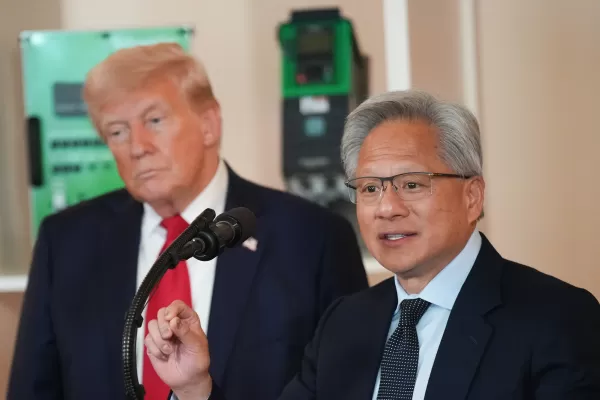US Pushes for Nvidia to Reduce AI Chip Sales to China

Recent reports from The New York Times and The Financial Times reveal that the Trump administration has mandated Nvidia and AMD allocate 15% of their AI chip sales revenue from China to federal coffers. This unprecedented arrangement reportedly followed negotiations between Nvidia CEO Jensen Huang and former President Donald Trump just prior to the Commerce Department issuing export licenses for AI chips.
During a Monday press briefing, President Trump substantiated these reports, disclosing he initially demanded 20% before settling at 15% after discussions with Huang. "I told him 'America deserves 20% if we're approving this,'" Trump recounted. "He countered with 15%, so we struck that compromise."
The licensed exports include modified versions of both companies' flagship products - Nvidia's H20 and AMD's MI308 processors - deliberately engineered with reduced capabilities to satisfy U.S. export controls implemented last April. While both firms confirmed impending shipments last month following license approvals, Nvidia's H20 recently drew scrutiny from Chinese authorities over potential security vulnerabilities.
Trump dismissed concerns about the H20, characterizing it as "existing technology China already possesses." He suggested conditional approval for Nvidia's cutting-edge Blackwell processors, contingent on substantial performance reductions between 30-50%.
Projections suggest this agreement could generate approximately $2 billion annually for U.S. government revenues, according to The New York Times. The publication described the arrangement as extraordinary, consistent with the administration's unconventional financial strategies including cryptocurrency-backed fundraising, university litigation, media network disputes, and sweeping tariff implementations. These developments follow Trump's recent ultimatum threatening 100% semiconductor tariffs unless domestic manufacturing commitments materialize.
Related Developments
- Trump calls for Intel CEO's resignation over Chinese affiliations
- Proposed 100% chip tariff contains significant exemption clause
The former president disclosed earlier this year he contemplated breaking up Nvidia before Huang's diplomatic efforts secured relaxed export controls. Trump has repeatedly intervened in corporate matters under national security justifications, including proposals for U.S. government equity in TikTok and demands for Intel leadership changes regarding Chinese relationships.
Updated August 11th: Includes presidential confirmation.
Related article
 Google Expands NotebookLM AI Access to Students Under 18
Google has unveiled significant upgrades to its Classroom platform, introducing free Gemini AI tools for educators and expanding access to NotebookLM for students under 18—marking the first availability of these tools for younger users.Educators usin
Google Expands NotebookLM AI Access to Students Under 18
Google has unveiled significant upgrades to its Classroom platform, introducing free Gemini AI tools for educators and expanding access to NotebookLM for students under 18—marking the first availability of these tools for younger users.Educators usin
 ChatGPT CEO Considers Possibility of Introducing Advertising Platform
OpenAI Explores Revenue Streams, Considers ChatGPT Advertising
OpenAI is evaluating various monetization strategies, with advertising in ChatGPT emerging as a potential option. During a recent Decoder interview, ChatGPT head Nick Turley adopted a c
ChatGPT CEO Considers Possibility of Introducing Advertising Platform
OpenAI Explores Revenue Streams, Considers ChatGPT Advertising
OpenAI is evaluating various monetization strategies, with advertising in ChatGPT emerging as a potential option. During a recent Decoder interview, ChatGPT head Nick Turley adopted a c
 Apple Intelligence Resumes News Summarization After Glitchy BBC Coverage
Apple Revives AI Notification Summaries in Latest iOS 26 Beta
Apple's fourth developer beta for iOS 26 reintroduces AI-powered notification summarization for news and entertainment applications, according to MacRumors. The feature had been temporari
Comments (0)
0/200
Apple Intelligence Resumes News Summarization After Glitchy BBC Coverage
Apple Revives AI Notification Summaries in Latest iOS 26 Beta
Apple's fourth developer beta for iOS 26 reintroduces AI-powered notification summarization for news and entertainment applications, according to MacRumors. The feature had been temporari
Comments (0)
0/200

Recent reports from The New York Times and The Financial Times reveal that the Trump administration has mandated Nvidia and AMD allocate 15% of their AI chip sales revenue from China to federal coffers. This unprecedented arrangement reportedly followed negotiations between Nvidia CEO Jensen Huang and former President Donald Trump just prior to the Commerce Department issuing export licenses for AI chips.
During a Monday press briefing, President Trump substantiated these reports, disclosing he initially demanded 20% before settling at 15% after discussions with Huang. "I told him 'America deserves 20% if we're approving this,'" Trump recounted. "He countered with 15%, so we struck that compromise."
The licensed exports include modified versions of both companies' flagship products - Nvidia's H20 and AMD's MI308 processors - deliberately engineered with reduced capabilities to satisfy U.S. export controls implemented last April. While both firms confirmed impending shipments last month following license approvals, Nvidia's H20 recently drew scrutiny from Chinese authorities over potential security vulnerabilities.
Trump dismissed concerns about the H20, characterizing it as "existing technology China already possesses." He suggested conditional approval for Nvidia's cutting-edge Blackwell processors, contingent on substantial performance reductions between 30-50%.
Projections suggest this agreement could generate approximately $2 billion annually for U.S. government revenues, according to The New York Times. The publication described the arrangement as extraordinary, consistent with the administration's unconventional financial strategies including cryptocurrency-backed fundraising, university litigation, media network disputes, and sweeping tariff implementations. These developments follow Trump's recent ultimatum threatening 100% semiconductor tariffs unless domestic manufacturing commitments materialize.
Related Developments
- Trump calls for Intel CEO's resignation over Chinese affiliations
- Proposed 100% chip tariff contains significant exemption clause
The former president disclosed earlier this year he contemplated breaking up Nvidia before Huang's diplomatic efforts secured relaxed export controls. Trump has repeatedly intervened in corporate matters under national security justifications, including proposals for U.S. government equity in TikTok and demands for Intel leadership changes regarding Chinese relationships.
Updated August 11th: Includes presidential confirmation.
 Google Expands NotebookLM AI Access to Students Under 18
Google has unveiled significant upgrades to its Classroom platform, introducing free Gemini AI tools for educators and expanding access to NotebookLM for students under 18—marking the first availability of these tools for younger users.Educators usin
Google Expands NotebookLM AI Access to Students Under 18
Google has unveiled significant upgrades to its Classroom platform, introducing free Gemini AI tools for educators and expanding access to NotebookLM for students under 18—marking the first availability of these tools for younger users.Educators usin
 ChatGPT CEO Considers Possibility of Introducing Advertising Platform
OpenAI Explores Revenue Streams, Considers ChatGPT Advertising
OpenAI is evaluating various monetization strategies, with advertising in ChatGPT emerging as a potential option. During a recent Decoder interview, ChatGPT head Nick Turley adopted a c
ChatGPT CEO Considers Possibility of Introducing Advertising Platform
OpenAI Explores Revenue Streams, Considers ChatGPT Advertising
OpenAI is evaluating various monetization strategies, with advertising in ChatGPT emerging as a potential option. During a recent Decoder interview, ChatGPT head Nick Turley adopted a c
 Apple Intelligence Resumes News Summarization After Glitchy BBC Coverage
Apple Revives AI Notification Summaries in Latest iOS 26 Beta
Apple's fourth developer beta for iOS 26 reintroduces AI-powered notification summarization for news and entertainment applications, according to MacRumors. The feature had been temporari
Apple Intelligence Resumes News Summarization After Glitchy BBC Coverage
Apple Revives AI Notification Summaries in Latest iOS 26 Beta
Apple's fourth developer beta for iOS 26 reintroduces AI-powered notification summarization for news and entertainment applications, according to MacRumors. The feature had been temporari





























